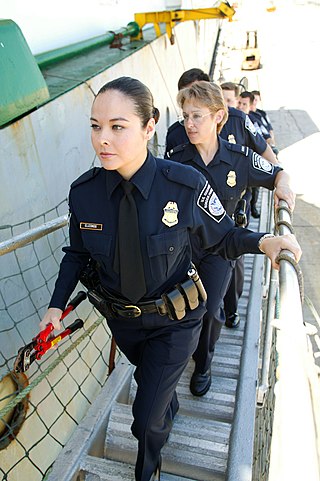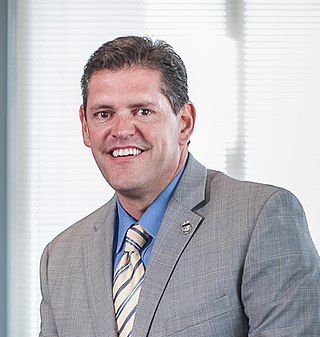
The United States Department of Homeland Security (DHS) is the U.S. federal executive department responsible for public security, roughly comparable to the interior or home ministries of other countries. Its stated missions involve anti-terrorism, border security, immigration and customs, cyber security, and disaster prevention and management.
U.S. Immigration and Customs Enforcement (ICE) is a federal law enforcement agency under the U.S. Department of Homeland Security. ICE's stated mission is to protect the United States from the cross-border crime and illegal immigration that threaten national security and public safety.
In the United States, a special agent is an official term used to refer to an investigator or detective for a federal or state government or independent agency, who primarily serves in criminal investigatory positions. Additionally, many federal and state special agents operate in "criminal intelligence" based roles as well. Within the U.S. federal law enforcement system, dozens of federal agencies employ federal law enforcement officers, each with different criteria pertaining to the use of the titles Special Agent and Agent.These titles are also used by many state level agencies to refer to their personnel.

The United States Customs Service was a federal law enforcement agency of the U.S. federal government. Established on July 31, 1789, it collected import tariffs, performed other selected border security duties, as well as conducted criminal investigations.

United States Customs and Border Protection (CBP) is the largest federal law enforcement agency of the United States Department of Homeland Security. It is the country's primary border control organization, charged with regulating and facilitating international trade, collecting import duties, as well as enforcing U.S. regulations, including trade, customs and immigration. CBP is one of the largest law enforcement agencies in the United States. It has a workforce of more than 45,600 federal agents and officers. It is headquartered in Washington, D.C.

The Federal Air Marshal Service (FAMS) is a United States federal law enforcement agency under the supervision of the Transportation Security Administration (TSA) of the United States Department of Homeland Security (DHS).

The Federal Protective Service (FPS) is a federal law enforcement agency of the United States Department of Homeland Security (DHS). It is also "the federal agency charged with protecting and delivering integrated law enforcement and security services to facilities owned or leased by the General Services Administration (GSA)"—over 9,000 buildings—and their occupants.
Intellectual property rights (IPRs) have only been acknowledged and protected in China since 1980. China has acceded to the major international conventions on protection of rights to intellectual property. Domestically, protection of intellectual property law has also been established by government legislation, administrative regulations, and decrees in the areas of trademark, copyright, and patent. Although this IP framework is developing quickly, as of 2023 it remains less developed than most industrialized countries.

The Federal Law Enforcement Training Centers (FLETC) serves as an interagency law enforcement training body for 105 United States government federal law enforcement agencies. The stated mission of FLETC is to "...train those who protect our homeland". Through the Rural Policing Institute (RPI) and the Office of State and Local Training, it provides tuition-free and low-cost training to state, local, campus and tribal law enforcement agencies.

The Bureau of International Narcotics and Law Enforcement Affairs (INL) is an agency that reports to the Under Secretary for Civilian Security, Democracy, and Human Rights within the Department of State. Under the umbrella of its general mission of developing policies and programs to combat international narcotics and crime, INL plays an important role in the training of partner nation security forces.

The Under Secretary for Terrorism and Financial Intelligence is a position within the United States Department of the Treasury responsible for directing the Treasury's efforts to cut the lines of financial support for terrorists, fight financial crime, enforce economic sanctions against rogue nations, and combat the financial support of the proliferation of weapons of mass destruction. The Under Secretary is appointed by the President and confirmed by the Senate.

The Organized Crime Drug Enforcement Task Force (OCDETF) is a federal drug enforcement program in the United States, overseen by the Attorney General and the Department of Justice. The principal mission of the OCDETF program is to identify, disrupt, and dismantle the major drug trafficking operations and tackle related crimes, such as money laundering, tax and weapon violations, and violent crime, and prosecute those primarily responsible for the nation's drug supply.

The federal government of the United States empowers a wide range of federal law enforcement agencies to maintain law and public order related to matters affecting the country as a whole.
The Prioritizing Resources and Organization for Intellectual Property Act of 2008 is a United States law that increases both civil and criminal penalties for trademark, patent and copyright infringement. The law also establishes a new executive branch office, the Office of the United States Intellectual Property Enforcement Representative (USIPER).

Arif Alikhan is a former senior official with the U.S. Department of Justice who has served in several high-level law enforcement and homeland security positions with the federal government and City of Los Angeles. He was also the Deputy Executive Director for homeland security, law enforcement, and fire/EMS at Los Angeles World Airports. He was appointed to the new position in October 2011 and is responsible for the 1,200 sworn police officers and civilian security officers that protect Los Angeles International Airport, Ontario International Airport, and Van Nuys Airport. He is also responsible for all fire and emergency medical services at LAWA's three airports. Alikhan is a former distinguished professor of homeland security and counterterrorism at the National Defense University (NDU), College of International Security Affairs in Washington, D.C. He teaches and lectures on a variety subjects involving homeland and national security issues for U.S. military and civilian security professionals. and is a recognized expert on U.S. government homeland security and counter terrorism policies.
Counterfeit consumer goods are goods, often of inferior quality, made or sold under another's brand name without the brand owner's authorization. Sellers of such goods may infringe on either the trademark, patent or copyright of the brand owner by passing off its goods as made by the brand owner. Counterfeit products made up 5 to 7% of world trade in 2013, and in 2014 cost an estimated 2.5 million jobs worldwide, with up to 750,000 jobs lost in the U.S. About 5% of goods imported into the European Union in 2013 were fakes, according to the OECD.

Richard O'Dwyer is a British entrepreneur & computer programmer who created the TVShack.net search engine while a student at Sheffield Hallam University.

Operation In Our Sites is an ongoing effort by the U.S. government's National Intellectual Property Rights Coordination Center to detect and hinder intellectual property violations on the Internet. Pursuant to this operation, governmental agencies arrest suspects affiliated with the targeted websites and seize their assets including websites' domain names. Web users intending to access targeted websites are directed to the server operated by the U.S. government, and greeted with a graphic bearing the seals of the United States Department of Justice (DOJ), the National Intellectual Property Rights Coordination Center (NIPRCC), and U.S. Immigration and Customs Enforcement (ICE).

James A. "Jim" Dinkins is an American law enforcement officer and business executive who served as the first head of Homeland Security Investigations for U.S. Immigration and Customs Enforcement from 2010 to 2014. He is a senior vice president and director of operations of Enterprise Financial Crimes Compliance for U.S. Bancorp.

The Director of the U.S. Immigration and Customs Enforcement (ICE) is a civilian official in the United States Department of Homeland Security. During July 2010 the position's title was changed from Assistant Secretary for U.S. Immigrations and Customs Enforcement.
















